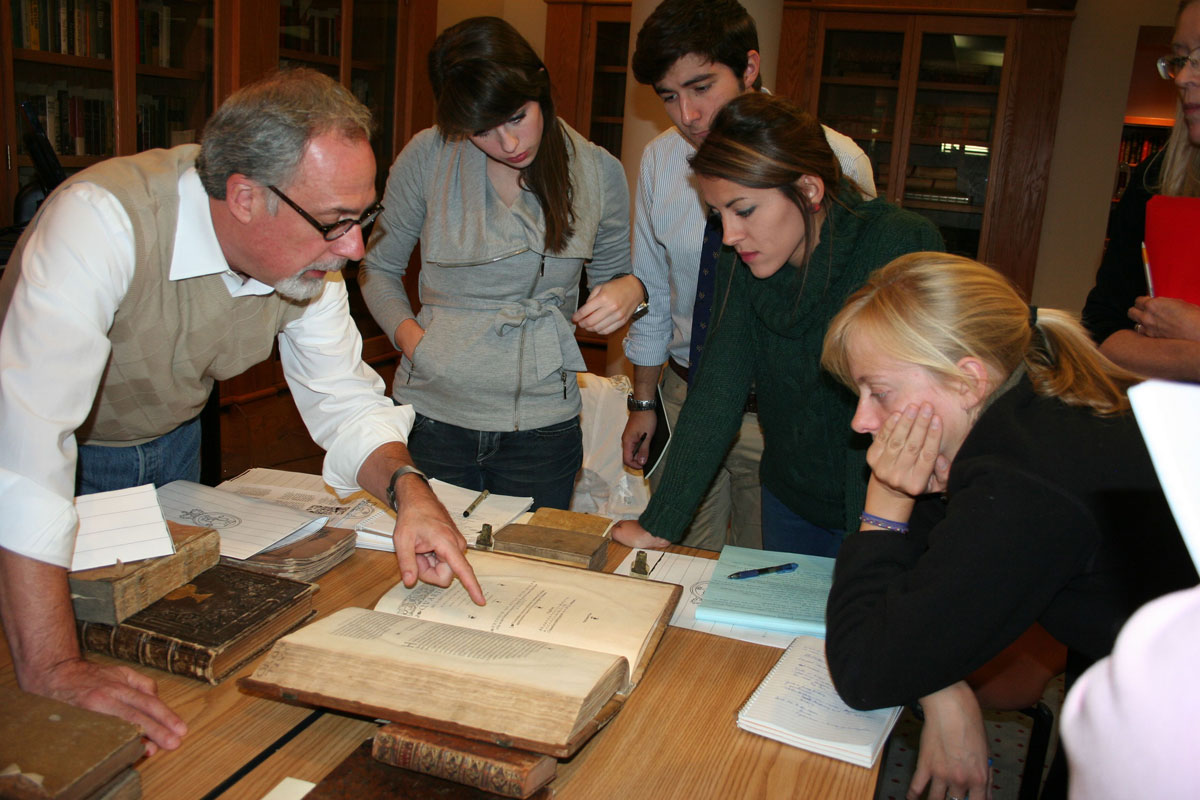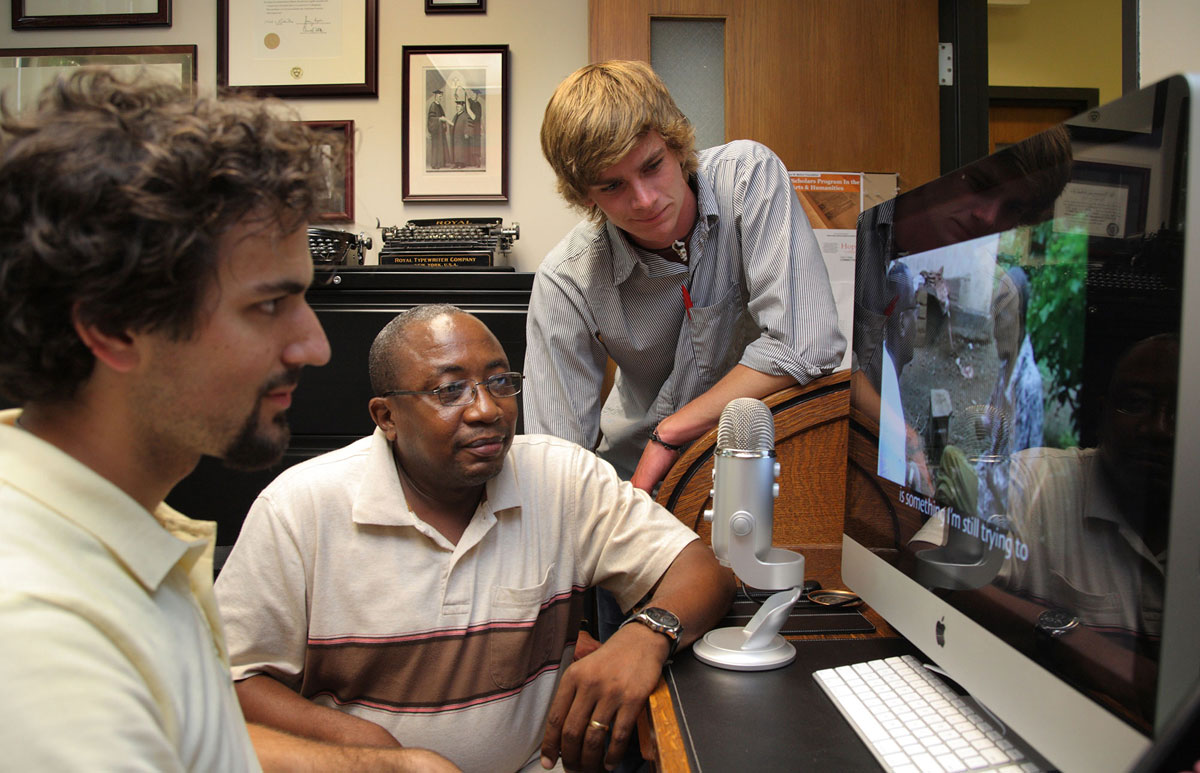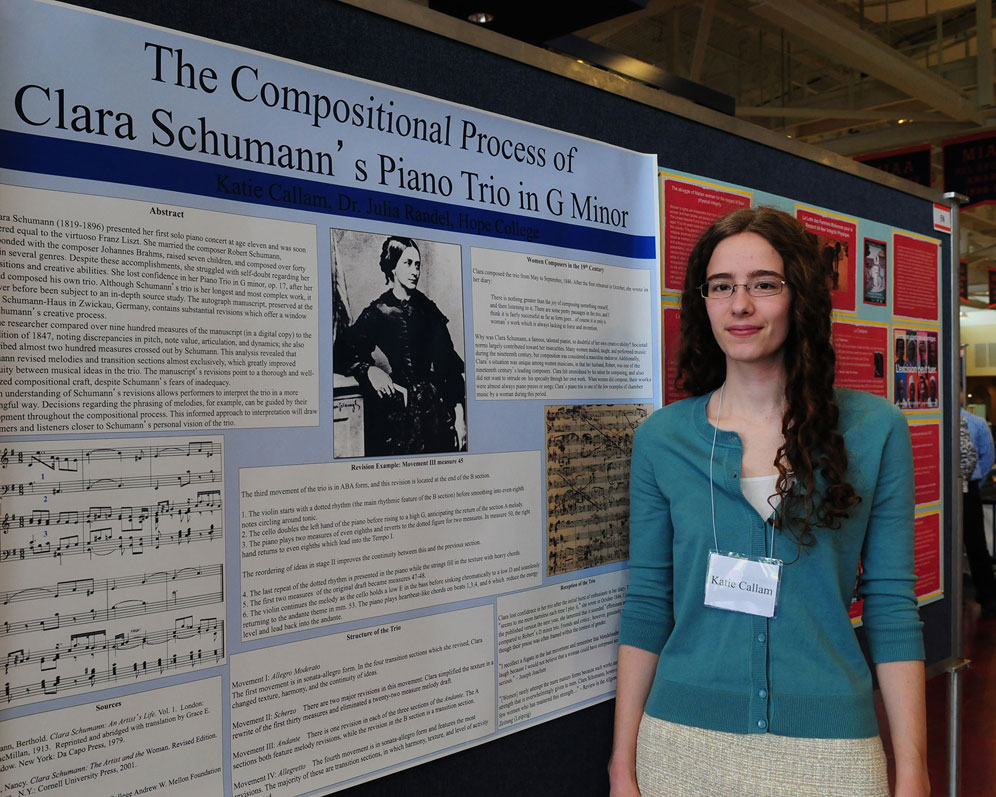Andrew W. Mellon Foundation Scholars Program in the Arts and Humanities, Hope College
A three-year, 24-credit academic program and summer fellowship program based on collaborative research in the arts and humanities with an emphasis on digital approaches, grant-writing, presentation, and experiential education. For more information, contact Anne Heath or see the program’s website.
Mission
To encourage scholarly collaboration among arts and humanities students and faculty; to strengthen engagement with digital humanities on the institutional level; to foster collaboration with other institutions; and to provide experiences and opportunities that will equip students for a variety of career options.
Launched in 2010, the Mellon Scholars program at Hope College has three interrelated goals: to encourage deep collaboration among arts and humanities students and faculty; to highlight student achievement to a broader public; and to build institutional engagement in the digital humanities. The program works with students over multiple semesters to lead them into progressively closer collaboration with faculty, deep research engagement, and public communication of that research.

People
A highly selective undergraduate program directed by William Pannapacker, the Mellon Scholars Program also involves faculty representatives from all departments in the Arts and Humanities division of the college.
The Mellon Scholars Program involves a larger number of people than many of the other programs featured on the network, which suggests the possibility of a broader reach within the institution. Each year, a cohort of 17-20 exceptional students are selected by a committee following a rigorous application process; at full-capacity, the program should include about 50 students. The program has a strong focus on interdisciplinarity, so the seminars that take place during the first two semesters of study are taught by rotating faculty members representing a wide range of departments in the Arts and Humanities division. In the second and third years of study, students select from a range of options, including individual tutorials, intensified upper-division courses, experiential education, cross-cohort digital projects, and off-campus research experiences, among other options.

Mellon Scholars participating in a workshop at the Rare Book Collections of Van Wylen Library.

William Pannapacker
The program is directed by William Pannapacker, Professor of English, Director of the Andrew W. Mellon Foundation Scholars Program in the Arts and Humanities, Faculty Director of the Great Lakes Colleges Association's Digital Liberal Arts Initiative. His research and teaching interests include American literature and culture and digital humanities. Pannapacker is also a columnist for the Chronicle of Higher Education and a contributor to The New York Times and Slate, where he writes about a range of issues related to higher education in the humanities.
Structure
This six-course program includes a variety of modular options, including seminars, high-level courses with individual mentoring, collaborative digital projects, and individual capstone projects. Students are encouraged to present their work at conferences and online, to seek grant support for their work, and to connect their research with a variety of career paths.
The Mellon Scholars Program recruits first- and second-year students for a two-semester seminar on scholarly research and writing, collaboration, presentation, grant-writing, and digital skills. For their remaining credits, students select from a variety of options including: intensified upper-division courses with individual mentoring and substantial research expectations; faculty-led, team-based, cross-cohort digital projects (e.g.,“Digital Holland, Michigan”); faculty-mentored, individual capstone projects, some of which are funded summer fellowships; technology courses (e.g., “Web Design”); off-campus research experiences (Newberry Library Program); summer internships in the digital humanities (the MATRIX Center at Michigan State); and internships supported by coursework in the digital humanities at The Philadelphia Center (“DH in the Workplace”).

Mellon Scholars working on a project on digital storytelling involving survivors of the civil war in Sierra Leone.
Research
Participating students have completed capstone projects on a wide range of topics and presented them to the community, both within the institution and at broader conference settings. Future cohorts will have many options for the kinds of projects and research they undertake.
Students present work online and at conferences throughout their involvement in the program. Additionally, in most cases, the culminating year of the Mellon Scholars Program leads to the creation of a capstone project. There are wide-ranging possibilities for the specific nature of the students’ research; one common feature is that the projects are intended to be something beyond a paper that can be presented in a public environment, typically at the college’s Celebration of Undergraduate Research and Creative Performance and national undergraduate conferences such as NCUR and Posters on the Hill.

Mellon Scholar Katie Callam presenting her work on Clara Schumann.
A glance at the project abstracts reveals the scope of projects across arts and humanities disciplines. The final community presentation element provides students with the important practice of communicating about their research to a wider audience—a skill that is not commonly taught in undergraduate humanities programs.
Support
The program is currently funded by a grant from the Andrew W. Mellon Foundation, supplemented by internal funding to support faculty development.
The program was developed thanks to a grant from the Andrew W. Mellon Foundation, and is further supported by internal funding to support faculty development. The grant will cover the first five years of the program’s development; beyond that, funding for subsequent years will require additional grants or internal support.
Directions
Signs of success would include: deeper faculty engagement with collaborative research and digital approaches; increasingly strong pool of applicants; a growing variety of high-quality projects and presentations; and successful placement of graduates in appropriate career paths.
As the program solidifies, Pannapacker hopes that it will continue to attract a competitive and varied applicant pool; that students will continue to produce innovative projects based on original research; and that students who graduate will successfully pursue a range of satisfying career paths. The program depends on the investment of faculty time and expertise, so Pannapacker also hopes that faculty will continue to see the value of the program and become more deeply engaged with it. As student projects grow more sophisticated, the program might also require faculty to advance their own skills and training so that they can continue to provide high-quality mentorship to their students. One benefit as the program grows more mature is that past scholars will become a resource for subsequent classes.
Because the program is grant funded, its continued development is dependent upon a longer-term funding solution. While not in immediate need of new support, over the next few years it will be important that the program either secures additional grant funding or obtains support from the institution itself.
Nuts & Bolts
Faculty investment is among the most important factors for success, and helps ensure a successful student experience as well as institutional support. Other important variables are demonstrated success of projects and effective career development.
Because the program has such a long duration, there are some particular factors to keep in mind if you’re considering implementing something similar. Also, as with other programs featured in the Praxis Network, the involvement of many different departments and disciplines has clear advantages as well as potential challenges.
- Students’ needs may change during the course of the program, and they will likely benefit from different types of support and guidance from one year to the next.
- In addition to ample high-quality mentorship, it is also essential to make guidelines and expectations as clear as possible, and to allow for flexibility when needed.
- Undergraduates typically have limited research experience when they begin, so the program represents a significant range of new skills and approaches.
- Prepare in advance for varied expectations, methodological assumptions, and comfort levels with digital technologies—both on the part of students and faculty.
- If possible, engage with other institutions to share expertise and guidance.